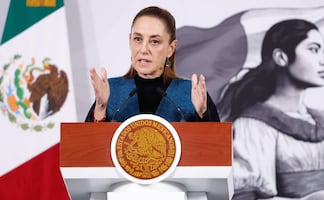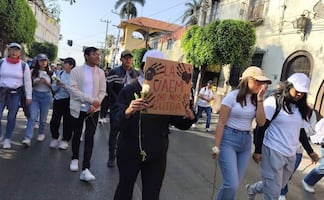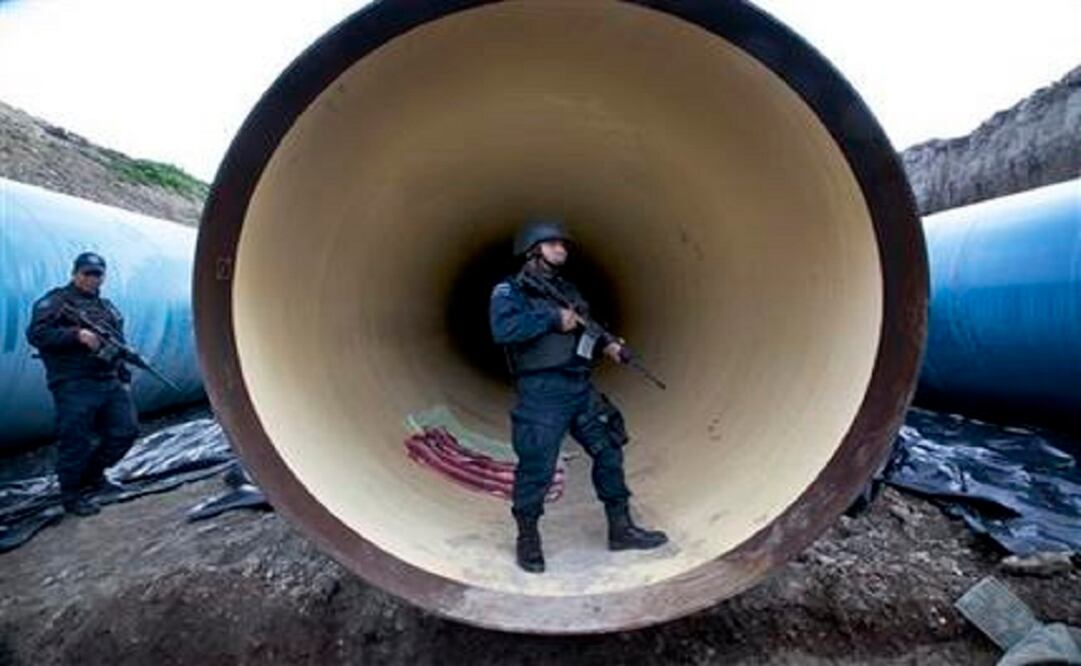Más Información

Cónsul Honorario de Filipinas es socio de empresa vinculada al CJNG; inmobiliaria fue sancionada por EU

Sheinbaum: Ya vamos a presentar la información de personas desaparecidas; va contra reclutamientos forzados de la delincuencia

Kershenobich: Trasplantes de órganos dejan de ser “heroicos”; destaca consolidación del proceso quirúrgico en el sistema de salud

Corte ordena a Hacienda pago de 103 mdp a Televisa por “impuestos indebidos”; Batres pide no desechar el asunto

Universitarios marchan en Morelos por desaparición de Kimberly Jocelyn; fiscalía investiga cuerpo hallado
Reactions in the United States to the escape from Mexican prison of Joaquín "El Chapo" Guzmán, Mexico's most powerful drug lord, ranged from disbelief to outrage, with some observers saying it dramatically illustrated the need for captured cartel kingpins to be promptly extradited to the U.S.
"All the accolades that Mexico has received in their counter-drug efforts will be erased by this one event" if Guzmán is not recaptured, said Michael S. Vigil, a retired U.S. Drug Enforcement Administration chief of international operations.
More than anything else, the escape undermined Mexico's assertion it can deal with top drug lords at home and doesn't need to extradite them to the U.S. The national pride that appeared to motivate Peña Nieto's administration to prosecute drug lords like Guzmán through its own court system has now turned into a national embarrassment.
"For the most-wanted criminal to escape from the highest-security prison is going to create conflicts, the first of them with the United States," Mexican security expert Jorge Chabat said Sunday.
According to a report from the Congressional Research Service in May, extraditions from Mexico to the U.S. peaked at 115 in 2012, the last year of Peña Nieto's predecessor, Felipe Calderón. There were 66 last year.
A former administrator of the Drug Enforcement Administration said he was dismayed by Joaquín "El Chapo" Guzmán's weekend escape - apparently through a mile-long tunnel - from the Altiplano prison, 55 miles west of Mexico City.
"It is a shock that the most dangerous cartel leader in the world has escaped," Peter Bensinger said Sunday. "He ought to have been housed in an American prison."
Washington's official response was diplomatic, as Attorney General Loretta Lynch said in a statement Sunday that the U.S. shared "Mexico's concern regarding the escape" and stood by to help in the manhunt.
But one Mexico expert said American officials likely expressed more frustration behind the scenes.
"I think this will add to the distrust many U.S. agencies feel (toward the Mexican government) - even if that's not publicly voiced," said David Shirk, San Diego-based fellow for the Woodrow Wilson International Center for Scholars.
At least some observers said they weren't surprised by Guzmán's escape given Mexican prisons' reputation, including Gal Pissetzky, a defense attorney who has represented suspected drug traffickers in U.S. courts nationwide.
"I'm surprised he stayed locked up in there as long as he did," Pissetzky said.
The Chicago Crime Commission, an influential crime-fighting group in Illinois, said Sunday that the prison break meant Guzmán will regain his title as Public Enemy No. 1 in Chicago, where his Sinaloa cartel has long dominated the cocaine and heroin trade.
When the group attached the Public Enemy label to Guzmán a year before his capture, it was the first time it had been used since it was applied in 1930 to Prohibition-era gangster Al Capone. The Chicago Crime Commission planned to formally restore the title to Guzmán this week, said John Pastuovic, a spokesman for the non-governmental body.
Several U.S. attorneys' offices have indicted Guzmán on trafficking charges, including in Chicago, where several Guzmán lieutenants were successfully extradited, prosecuted and imprisoned. The U.S. had said after Guzmán's 2014 capture that it would file an extradition request, though it's unclear if that already happened.
For its part, Mexico's government at the time denied the need to extradite Guzmán even as many expressed fears he would inevitably escape. He had escaped before, in 2001, while serving a 20-year sentence in another maximum-security prison in Mexico.
That air of self-confidence among Mexican authorities will be harder to maintain if and when Mexico recaptures Guzmán or nabs some other cartel leader, Shirk said.
"The calls for extradition (to the U.S.) will be more intense" in the wake of Guzmán's escape, he said. "It'll be more difficult for the Mexican government to say, `No, no. We have this under control.'"
Added Shirk, "It is clear that maximum security prisons in Mexico are anything but."
The escape also hurt Pena Nieto domestically. He had campaigned on one main promise - to diminish drug cartel violence - and had claimed success in attacking drug gang capos like no administration before, arresting or killing essentially all the top leadership of the Zetas, Beltrán Leyva and Knights Templar cartels.
It was a highlight for an administration struggling on other fronts, including a lackluster economy and scandals over the disappearance of 43 college students, and the purchase by the president's wife of a mansion, known as the "white house," from a government contractor.
"This hurts him a lot. It is an administration that already has a lot of image problems, with the scandals over the students and the `white house,' and now this comes along and paints them as an administration with serious problems of inefficiency and corruption," Chabat said.
"This is regrettable, very bad, because it without doubt affects the image of Mexico in the world," Mexican Sen. Luis Miguel Barbosa told journalists in Paris on Monday. He was part of a delegation traveling with the Mexican president to the French capital.
"You have to completely renew the Mexican prison system. The arrest of all warders and managers is not enough," he said. "This happened due to collaboration from within the jail at the highest level."
Noticias según tus intereses
[Publicidad]
[Publicidad]









